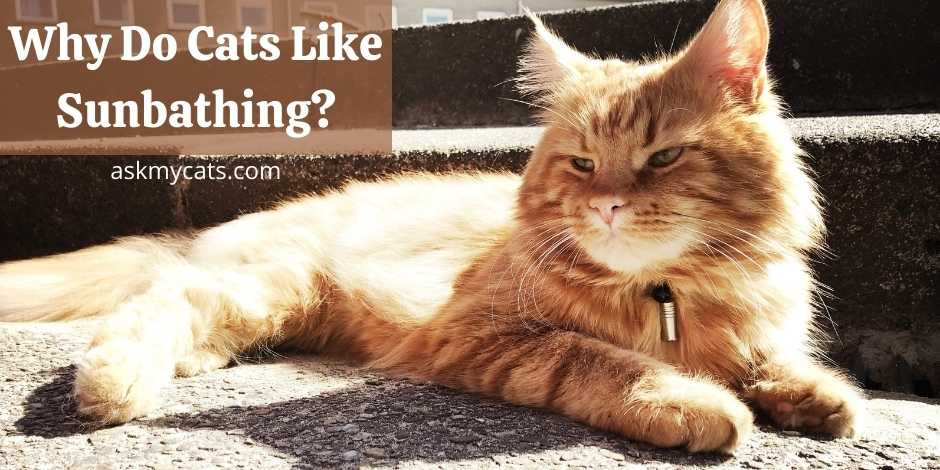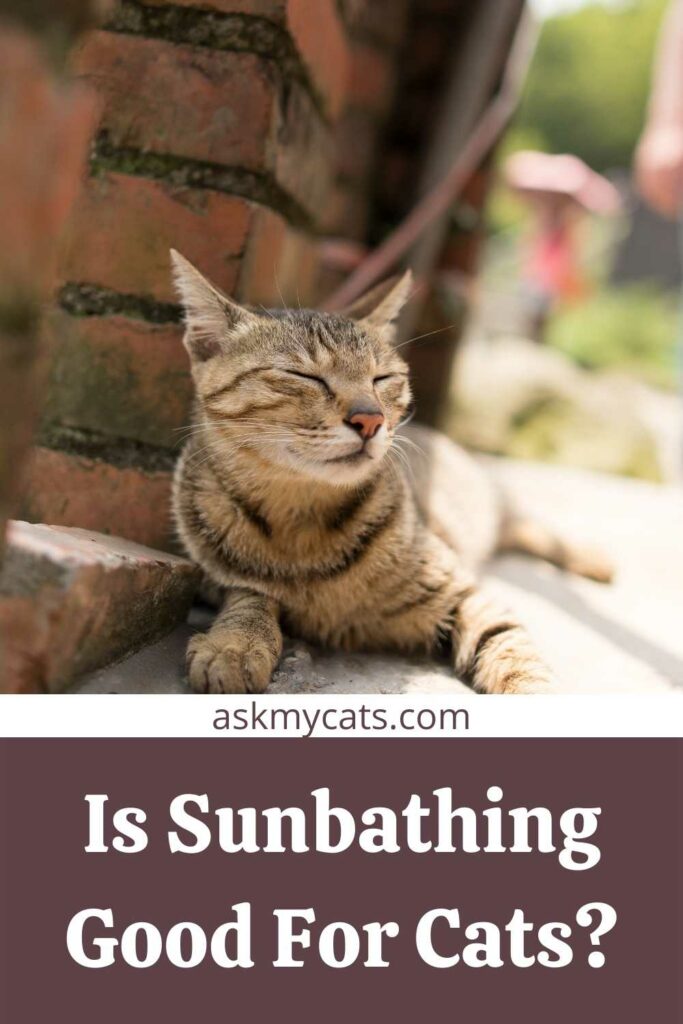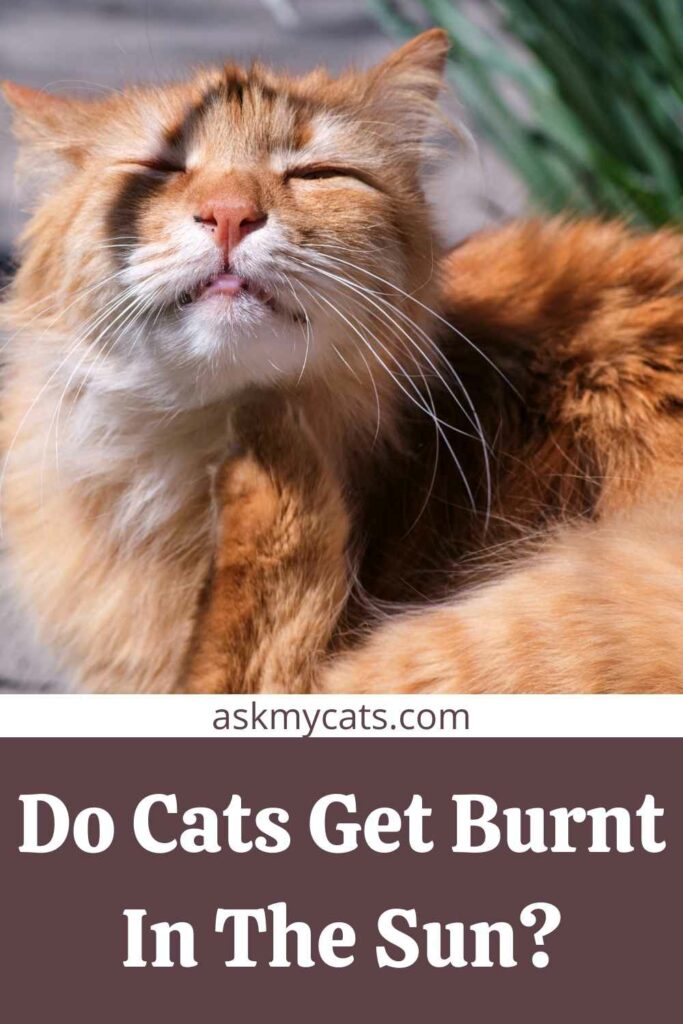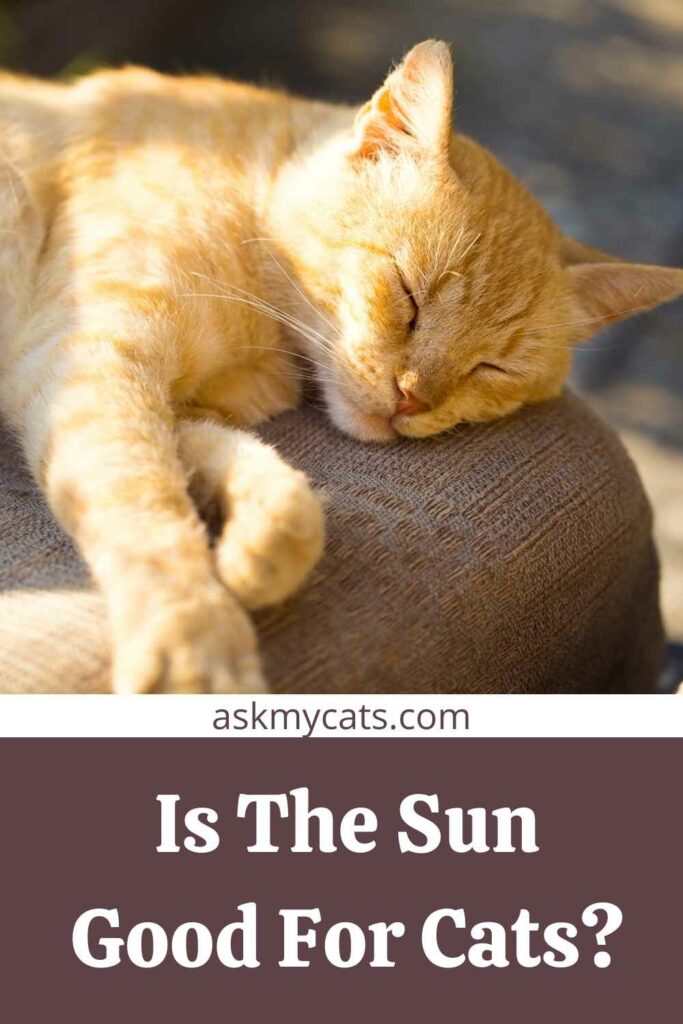Cats like sleeping in the sun and basking in the warmth of the sun’s rays especially in the spring and summer. This is such a regular occurrence that if you have a cat, you have certainly observed it. Why do cats enjoy being out in the sun? Can overexposure to sunshine be hazardous to our four-legged companion?
Sunbathing might also help your kitty’s body save energy. When your cat goes to sleep, her body temperature lowers somewhat and she may begin to feel chilly. The sun will keep her body warm as she sleeps, allowing her to feel lovely and comfy.
We’ll look at some of the numerous reasons why your feline buddy would desire to locate the hottest location in the house all year long in the sections below.
Of course, every cat is unique, so this may not apply to all of your felines, but these are just a few of the basic reasons that cats like sunbathing.


Give Your Cat the Perfect Day
Get the Free Ebook!
Is Sunbathing Good For Cats?
Yes, sunbathing can be beneficial to cats as it helps to maintain the temperature of a cat’s body. Also be cautious that the cat doesn’t get overheated.

Domesticated cats descended from a wild species, Felis sylvestris, which exists in Africa, Europe, and Asia, according to DNA research. All of our feline companions have a genetic line that dates back roughly 10,000 years to wild cat populations in the Middle East, especially Egypt, Israel, Iraq, Syria, and Cyprus – arid area.
So it’s rather hot there. It seems to explanation that our cats desire warmth since they are genetically desert creatures that lose heat easily due to their bodies’ adaptations to living in such a hot area.
Combine these genetics with their protein-rich diet — protein simply does not save energy in the same way that carbs do — and there isn’t much additional energy available to keep cats warm when their surroundings is a bit chillier than they are naturally built for. Sunbathing may also assist your kitty’s body in conserving energy.
As a result, she could prepare for a nap by first choosing a warm and pleasant location to rest down, such as one with plenty of sunlight. The sun will keep her body warm as she sleeps, allowing her to feel lovely and comfortable. You may even observe that if she wakes up and discovers that the sunbeam has shifted, she will adjust her position so that she is back in the sunshine.
Sunbathing appears to be as near to desert life as my kitties can come.
So, despite their fur coats, cats must work harder to keep their bodies as warm as they are genetically meant to be — and we humans must be conscious of this, such as not expecting cats to live outside in the winter without comfortable, warm places to sleep.
It doesn’t have to be anything fancy; a modified dog home insulated with straw and blankets and stored in a wind-free location would suffice. Providing multiple meals of slightly warm cat food and warm water throughout the day also makes the winter months a little more bearable for barn cats and wild cats that can’t be kept indoors.
Do Cats Like To Sleep In The Sun?
Yes, cats like to sleep in the sun because cats are derived from desert-dwelling animals, therefore they are adapted to live in the sun. Furthermore, ambient warmth makes napping more comfortable for cats.
When a cat sleeps, its body temperature lowers, and lying in the sun helps to compensate. Cats may sleep for up to 15 hours a day, so sunshine is essential for keeping them comfortable.
Cats like basking in the sun. Indoor cats will sit near a window, soaking up whatever rays that may penetrate. Cats would often spend hours outside sunning and resting, displaying a reluctance to return inside.
If given the chance, many cats will spend the whole day in the sun. This temptation must be carefully handled. Cats can be burnt by the sun’s rays and get heatstroke or skin cancer as a result.
There are many kittens that will jump at the chance to lay and relax in a sunbeam, but bear in mind that cats might overheat. That’s right: cats can get hyperthermia.
It’s also essential to remember that when your cat becomes too hot, she can only sweat via her paw pads. Aside from that, when she becomes hot, she might pant to try to control her body temperature.
It is critical to be on the lookout for symptoms that your pet should be cooled down as soon as possible. Failure to do so may aggravate the disease, resulting in significant issues such as seizures, organ damage, coma, or death.
Why Do Cats Like Laying In The Sun?
The primary reason a cat will lay over in the sunlight is to expose its tummy. The cat will enjoy the warmth of the sun, but hair will keep it out of the way. The light shines on the cat’s naked tummy as it rolls around. This is a quick way to warm up and raise his body temperature.
Other bodily parts will also be protected by the cat. The heat of the sun, for example, will be felt via the ears and the nose. This might cause the nose leather to dry out, which is a pleasant sensation. By shifting its posture, the cat protects its ears and nose from UV radiation.
It’s also conceivable that your cat is just expressing sheer happiness. Cats frequently turn over to demonstrate their contentment. When a cat greets its owner, it may turn over. This might be a display of happiness since cats like sunbathing in the sun.
Keep an eye on your cat for any reason. If it turns onto its back, attempt to gently flip it over after a time. Excessive sun exposure endangers the cat’s health if it falls asleep.
Do Cats Get Burnt In The Sun?
Cats can become sunburned if they spend too much time outside. It will cause scorching and peeling of the skin.

This is as painful for a cat as it is for a person. Your cat will also be wary of being groomed or touched. Its skin will be extremely sensitive.
All cat breeds may become burnt, however some are more vulnerable than others. Longhaired cats are less prone to become sunburned. Their dense hair keeps UV rays from penetrating the skin as easily. However, this protection is only temporary. Sunburn is still possible.
Sunburn is particularly common in white cats. Hairless or thin-furred cats are likewise more vulnerable. UV rays will meet no resistance if the skin is not protected by a fur coat.
Sunscreen can be used to protect cats from sunburn. Pay special attention to hairless areas of the cat’s body, such as the belly, nose, ears, and lips.
However, there is one caveat: most human sunscreens are toxic to cats. Sunscreen contains the chemicals homosalate, ethylhexyl salicylate, and xalicylate, all of which are harmful to cats.
Look for cat-friendly sunscreen at your local pet store. If you can’t locate anything acceptable, look into sunscreens made for human new-borns. These are generally fragrance-free and chemical-free. However, before applying, consult with a specialist about your eligibility.
Is The Sun Good For Cats?
Yes, the sun is good for cat because sunlight, in suitable levels, is beneficial to cats.

Cats are far more content when they are warm and dry. As a result, summer is a favourite season for all felines. When the sun shines, cats find it much easier to unwind.
Allow your cat to sunbathe in the sun if it loves it. Simply follow the necessary safety precautions. Make sure your cat has a shaded spot to retire to if needed. However, there are some distinct advantages to allowing a cat to sunbathe.
It is a common misunderstanding that cats get their energy from the sun. Sunshine does not make a cat more colourful than cold conditions. Sunlight, on the other hand, keeps a cat’s energy levels up. As a result, sunshine is an excellent method for a cat to unwind and recoup after a long day.
Cats expend a lot of calories while going about their everyday activities. While it may appear that your cat spends the whole day napping, this is not due to laziness. It is a must. Hunting, playing, and general mobility are all taxing for a cat, especially as it ages.
Cats also need to expend calories in order to remain warm. This is why cats tend to be hungry in the winter.
The cat remains warm by basking in the sun’s rays. As a result, it consumes less energy. Of course, this results in an extra benefit of sunlight for cats. Your cat will not want to eat as much if it is warm. This can only be beneficial to a cat’s weight. This is especially important for older cats, which tend to be less active than younger cats.
While your cat does not acquire energy by sunbathing, it also does not lose any. This can significantly improve a cat’s comfort and quality of life. By taking advantage of the light, your cat may concentrate its physical energies on what is most important.
One of the many benefits of sunlight is the vitamin D it delivers. Cat skin does not absorb Vitamin D, according to the Feline Journal of Medicine and Surgery. Fur is obstructing access. Vitamin D must instead be obtained through diet.
This is not to say that your cat will not benefit from the sun’s rays. Vitamin D becomes trapped in the hair of the cat. The vitamin is ingested orally by the cat when it brushes itself. This is less efficient than direct skin absorption, but it is better than nothing.
This is especially crucial for elderly cats. The journal PLOS One describes how greater amounts of Vitamin D improve feline survival after illness.
Vitamin D cannot prevent illness on its own, but it does enhance immunity in times of risk. Moderation is essential in all things linked to the sun. Excessive Vitamin D can be harmful. Because of the large dosages of this component, rat poison, for example, is effective. Limit your cat’s time in the sun if he or she eats a well-balanced diet.
Sunlight and the natural surroundings influence cat hormones. This is especially essential in females who have not been spayed. The heat cycle of a cat is frequently influenced by the seasons.
Most cats go into heat in the spring and finish their yearly cycle in the fall. Cats have no access to a calendar. They use the sun to determine the time of year.
A cat’s body generates less melatonin when the light shines. This hormone inhibits the heat cycle. For cats, this is a matter of life and death. Feral or stray cats do not like to have kitten litters in the winter. Keeping them warm and secure will become increasingly challenging. As a result, with minimal sunlight, the cat does not go into heat.
If you want your female cat to reproduce, she must be exposed to sunlight. This will cause her hormones to be activated, and her body will take care of the rest. If a cat is kept indoors, away from natural light, her hormone cycle will get out of rhythm with the seasons.
Even if your cat is spayed or neutered, it still requires sunlight to balance its hormones. Sunshine indicates to a cat when it is time to grow or lose hair. Longer, brighter days signal to the cat that summer is on its way.
As a result, the cat begins to shiver. This is especially critical for longhaired dogs. These cats may get uncomfortable in the sun if they do not have this natural response to sunshine.
Can Cats Live Without Sunlight?
Cats can survive without the sun, but they are happier when it is out and they can enjoy it.
While cats enjoy being outside in the sun since it improves their health and helps them feel more comfortable and calm, you must be careful not to leave your kitty out in the sun for too long, especially during the summer.
To thrive, all living things require sunshine. Cats are no different. Fortunately, it is really simple to provide. Allow your kitten to wander about for a few hours each day if you have a screened-in area, or construct them their own place, such as a catio or playpen.
Frequently Asked Questions
Can Cats Get Skin Cancer from The Sun?
Cats that spend too much time in the sun are at danger of developing basal cell carcinoma or squamous cell carcinoma. Skin cancer is not a concern that develops overnight. For this to be a serious risk, your cat will need to get sunburned several times. If your cat has been sunburned, keep it away from UV rays for an extended length of time.
Can Cats Get Sunstroke?
If a cat spends several hours basking in the sun, it is at danger of sunstroke. This gradually raises the cat’s body temperature above a safe range. Any temperature higher than 100 degrees Fahrenheit is hazardous. A temperature of 104 degrees or above is considered an emergency.
What happens if cats don’t get enough sunlight?
Cats are light sensitive, and a lack of sunshine produces a drop in serotonin, a chemical neurotransmitter in our brains that influences our mood. Without enough sunshine, neither you nor your cat will produce enough melatonin, the hormone that regulates sleep cycles.
Final Words
Cats should always be allowed to bask in the sun. Allow a kitty to bask in the sun’s rays and reap the benefits that come with it. Simply be aware of the dangers. Bring your cat indoors if you believe it has received enough sun. It is always better to be safe than sorry.
Please leave your questions about your pet friend’s feeding habits in the comments section below. We’ll get back to you as soon as possible.
